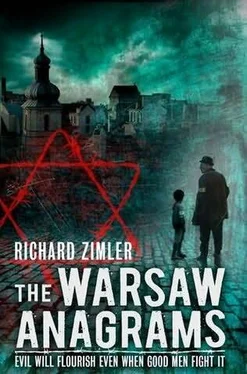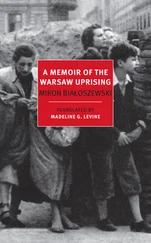‘Keep going!’ someone yelled at me in German.
Stepping over the man, I knew that our blood would never be completely erased from the streets of every Polish city and town – not even if it rained every day for a thousand years. And I was thinking: The Poles who survive this war will hate us for ever, because the bloodstained cobblestones of their cities and towns will remind them of their guilt.
On the train, inside an oven-hot cattle car, I dropped down and curled into a ball to keep from being crushed. I wanted water so badly that I’d have opened a vein had I carried anything sharp on me.
I must have passed out. When I awoke, soldiers were jabbing us with their rifle butts, their Alsatians straining for a chance to taste Jewish flesh. They marched us forward. My head was heavy and cumbersome, as though it might fall off from its own weight, and my dry, useless tongue was a dead lizard inside my mouth.
We arrived at a large camp of wooden barracks and were marched through the front gate up to a desk where two prisoners were ladling water into tin cups. The liquid tasted of metal, but I gulped it down as fast as I could. I didn’t have enough saliva yet to eat, or even an appetite, but I grabbed my crust of bread as if it were Hannah’s hand.
I slept that night on a wooden floor surrounded by other recent arrivals.
The next morning, after roll call, one of the head prisoners called out Izzy’s name, and when I answered, he led me into a barracks that had become a workshop for tailors and escorted me to the back, where three skeletal men were seated tightly together, hunched over a table piled with hundreds of watches. ‘Enjoy your new office,’ he told me, and just like that he walked away.
A tall, anxious-eyed young man with a shaved head stood up and shook my hand. I told him my legs were still unsteady and asked if I could sit.
‘Of course,’ he replied, standing aside and gesturing towards his chair.
He told me his name was Chaim Peczerski. He introduced me to his two co-workers, Jan Głowacz and Jakub Weinberg.
Jakub had a torn ear and spectacles missing a lens. I thought that maybe one of the Alsatians had attacked him. Later, when I got to know what he was capable of, I asked some other prisoners, and I was told he’d started a vicious fight with a tailor from Turobin who’d bitten him to keep from being strangled to death.
Chaim explained that the watches on their desks had been stolen from Jews, as well as from Polish and Russian prisoners of war. We were in a labour camp run by the SS.
I was so disoriented I asked him if we were anywhere near Lublin.
‘You’re in Lublin, you idiot!’ Chaim replied, laughing.
‘You’re a Hebrew slave working for Pharaoh now,’ Jan added, sticking a homemade cigarette in his lips and grinning.
He had a waxy, sweaty face that I found frightening – as if it were a mask.
‘You’ll work with me,’ said Jakub, and his tiny brown eyes darted falcon-like from my face to my hands and then my feet, as if he was on a stimulant. Only a week later did I realize why.
‘We’ve a lot of work,’ Chaim told me. ‘We have a quota to meet each day or we don’t get any bread.’
‘The problem is, I know nothing about fixing watches,’ I confessed. ‘I lied to the Germans.’
‘You what?’ Jakub demanded indignantly.
‘I lied.’
‘You old bastard!’ he spat out, and he looked over at Chaim as though to demand my execution. The youngest among us was apparently in charge.
‘I had to protect a friend,’ I explained.
‘That’s fine, but you’re not working with me!’ Jakub snarled.
I stood up to go, but Chaim pushed me back down roughly. ‘What do you really do?’ he asked.
‘I’m a failed novelist,’ I replied, since it seemed safer to keep pretending I was someone other than myself.
Jakub laughed at the absurdity, and Jan sneered, ‘You’re useless!’
‘Get up!’ Chaim ordered. He pointed to the door. ‘Wait outside while we talk.’
When he called me back in, he told me that Jakub and Jan had voted against letting me work with them, but that he had overruled them.
‘You’ve got three days to learn enough to hold your own,’ he told me in a voice of warning.
I worked hard, but after three days I was still pretty much useless with the tiny screwdrivers and pliers. Chaim came up with a solution, however; I would polish all the watches that he and his colleagues fixed, thereby doing a quarter of our total work. Jan found that acceptable, but Jakub cursed me. He also began referring to me as Dostoevsky’s Jewish Idiot , which he regarded as witty.
One night, about a week later, I awakened to find Jakub leaning over me, whispering Hebrew words I didn’t understand. When I tried to sit up, he pushed me back down. Then he tugged my shoes off my feet.
‘What’ll I wear?’ I asked, moaning.
‘That’s your problem!’
As he crawled back in his bunk, I realized that when we’d first met, he’d studied me for what I had that might be worth stealing.
The camp had an active black market, and in exchange for five days’ worth of the rancid broth that passed for our soup, I was soon able to obtain flimsy leather shoes – three sizes too big – that I stuffed with newspaper.
Jakub then started taking my bread right out of my hands, mocking me when I refused to fight him for it and only stopping when a bigger prisoner put a homemade knife to his neck.
Jakub wanted to punish me as much as he wanted life. Maybe they were even the same thing for him.
Sometimes I think he uttered a magical curse over me on the night he stole my shoes, or on another occasion when I didn’t wake up in time to know he was with me, and that’s why I’m still here.
Before the ghetto, I’d have thought that was impossible, Heniek, but listen…
Jakub’s brother-in-law was a rabbi from Chelm named Kolmosin – a sturdy little red-nosed man, maybe fifty years old. He and Jakub used to pray together on Friday evenings behind a burlap curtain they hung over their adjoining bunks. The rumour I heard was that the rabbi was a descendant of Shabbetai Tzvi, and that he knew powerful incantations that had been passed down from branch to branch in their family tree for twenty generations – incantations that governed life and death. He had bribed the guards to be able to keep a Torah the size of a deck of cards with him, and we often caught glimpses of him huddled over it, making rapid annotations with a tiny pencil. Chaim told me that if he wrote down your name, your destiny would change, and it would be good or bad depending on the nature of the verse in which he had inserted it. In consequence, prisoners would try to win Kolmosin’s good graces by polishing his shoes or darning his socks, or by giving him smuggled cigarettes, sugar or other small gifts. He was the only prisoner I ever saw in a clean white shirt. He lived like a pasha.
Once, in August, I saw the would-be holy man sitting naked on his red velvet cushion and singing to himself. He carried that ridiculous velvet cushion with him everywhere because of his haemorrhoids – which were apparently beyond the control of his magical annotations. Later, he taught the oriental-sounding tune to Jakub and some of the other prisoners. He claimed that he’d learned it in a vision and that it would keep us safe.
I was of the opinion that singing ‘ Deutschland, Deutschland über alles ’ would produce better results, but maybe Kolmosin had the last laugh; the more I think about it, the more I wonder if he might not have helped Jakub tether me to the earth by writing me into a verse of Torah that would make me return after death. Perhaps I represented an opportunity for him as well, but for what I cannot guess.
Читать дальше












